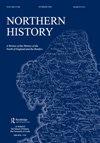A Community of Consent: Conscientious Objectors on the North Yorkshire Moors and the North East Coast During the First World War
IF 0.2
3区 历史学
Q2 HISTORY
引用次数: 0
Abstract
From 1916 onwards, the Military Service Appeal Tribunals gave men in Britain a mechanism to appeal their conscription into the army. Though tribunals across the country heard appeals from tens of thousands of men, the work of the tribunals is now largely forgotten; an officially sanctioned process which began with the destruction of all the tribunal documents in 1921. Using the recently discovered papers for the North Riding County Appeal Tribunal, I have identified a concentration of Conscientious Objectors on the North Yorkshire Moors and specifically along the ironstone mining area of the coast. The high rate of conscientious objection in these areas is suggestive of an anti-war community, but I argue these men appealing at the North Riding Tribunal cannot always be seen as being anti-war. These communities supported the war effort but put limits upon that support. This paper builds upon Cyril Pearce’s ideas around communities accepting of resistance to the First World War, which could be found across Britain, but challenges what these communities and Conscientious Objectors were resisting. If similar patterns can be identified in other parts of the country, this would nuance the narrative of conscientious objection away from men not wanting to fight to men not wanting to be in the army and accepting other forms of war work.同意的共同体:第一次世界大战期间北约克郡荒原和东北海岸的良心拒服兵役者
从1916年起,兵役上诉法庭为英国的男性提供了一种对他们被征召入伍提出上诉的机制。虽然全国各地的法庭审理了成千上万人的上诉,但法庭的工作现在基本上被遗忘了;这是一个官方批准的程序,始于1921年销毁所有法庭文件。根据最近发现的北里丁县上诉法庭的文件,我确定了北约克郡荒原上有一群出于良心拒服兵役者特别是沿海的铁矿矿区。这些地区的高良心拒服兵役率暗示了一个反战群体,但我认为,这些在北里丁法庭上上诉的人不能总是被视为反战人士。这些社区支持战争,但对这种支持加以限制。这篇论文建立在西里尔·皮尔斯关于接受抵抗第一次世界大战的社区的想法之上,这种想法在英国随处可见,但挑战了这些社区和良心拒服兵役者所抵制的东西。如果在这个国家的其他地方也能发现类似的模式,这将使人们对良心反对的看法从不想打仗转变为不想参军而接受其他形式的战争工作。
本文章由计算机程序翻译,如有差异,请以英文原文为准。
求助全文
约1分钟内获得全文
求助全文
来源期刊

Northern History
Multiple-
CiteScore
0.20
自引率
33.30%
发文量
37
期刊介绍:
Northern History was the first regional historical journal. Produced since 1966 under the auspices of the School of History, University of Leeds, its purpose is to publish scholarly work on the history of the seven historic Northern counties of England: Cheshire, Cumberland, Durham, Lancashire, Northumberland, Westmorland and Yorkshire. Since it was launched it has always been a refereed journal, attracting articles on Northern subjects from historians in many parts of the world.
 求助内容:
求助内容: 应助结果提醒方式:
应助结果提醒方式:


